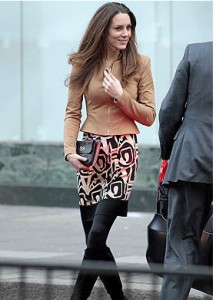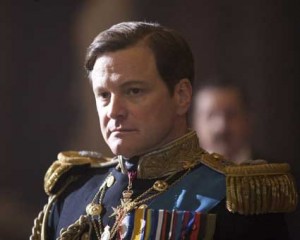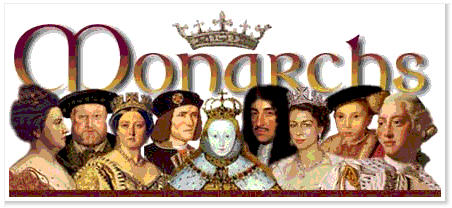The royal family betrayed its traditional pretense of being above partisan politics by inviting former Conservative prime ministers Margaret Thatcher and John Major while snubbing former Labour prime ministers Tony Blair and Gordon Brown. By contrast, all living prime ministers were invited to the royal wedding of Prince Charles and Lady Diana in 1981.
I am convinced, however, that Labour leaders are protesting this “gratuitous offense” not so much because Blair and Brown feel slighted, but because it reflects the kind of capricious royal prerogatives that simply cannot be tolerated in a democracy.
With that, here is the third commentary from February 16, 2011.
The Problem is Not Kate’s Weight, it’s William’s Title
I am profoundly dismayed that even American news organizations report every tidbit about the April 29 wedding of Prince William and Kate Middleton as if it were the latest breaking news about the revolutions spreading across the Middle East.
The latest example of this farce came on Monday when even the purportedly serious NBC Nightly News reported the hardly surprising news that William had chosen his brother Harry as his best man, and Kate her sister Pippa as her maid of honor. And in due course the media will undoubtedly be reporting on who received a coveted invitation to this wedding as if they were reporting on who made scrolls for entry into heaven.
 Meanwhile, I took a royal beating for ending my November 16, 2010 commentary on their engagement as follows:
Meanwhile, I took a royal beating for ending my November 16, 2010 commentary on their engagement as follows:
I wish this couple all the best—especially Kate. For, as Lady Di found out in so many tragic ways, marrying a prince and future king does not guarantee living a charmed life.
Indeed, William proposing to her with his mother’s engagement ring might be another bad omen in this respect. Not to mention that she already seems afflicted with the anorexia nervosa that the anxieties of joining ‘the firm’ caused Diana to develop….
(“Prince William to Kate: enough of the wait,” The iPINIONS Journal, November 16, 2010)
Well, I wonder what kind of flak the editors of London’s leading newspaper are taking for publishing a report a few days ago, which echoed my observations about Kate’s weight:
Every bride-to-be loses weight – but, with three months to her big day, Kate Middleton looks extra slim.
As she left a London restaurant the sporty curves that first caught Prince William’s eye seemed to have changed… Her legs, previously toned but shapely, looked very thin.
(The SUN, February 11, 2011)
After all, socialite and Princess Di friend Jemima Khan was reportedly disinvited from this wedding of the century for posting the following catty, but true tweet just weeks after I posted my offending commentary last November:
Kate Middleton – those are not heir-bearing hips are they? Unfeasibly thin.
Meow!!!
All the same, the point of my original commentary was not Kate’s weight; rather it was William’s title. Because, truth be told, I couldn’t care any less about whether or not Kate will end up on her “big day” as mere skin and bones underneath her wedding dress.
Instead, what concerns me is that people around the world seem even more vested in this anachronistic institution today than they were when William’s parents, Prince Charles and Lady Diana, got married 30 years ago (on July 29, 1981).
I have long maintained that royalty is anathema to the universal principle that all people are created equal. Moreover, that any democracy that institutionalizes royalty in the twenty-first century is almost as cancerous (and oxymoronic) as one that institutionalized slavery in the nineteenth.
This is why I find it somewhat hypocritical that Western media are praising the Egyptians for overthrowing their dictatorship, while celebrating the British for perpetuating their monarchy (with all of its state-supported perks, privileges, and regal indulgences). And it’s no consolation to argue in mitigation that Western monarchs are now constitutionally prohibited from oppressing their subjects the way Mideast dictators still do.
Because what offends is that monarchies are undemocratic by nature; dictatorships are not. In point of fact, Hosni Mubarak proved that anyone can grow up to be a dictator; whereas, William proves that only a royal heir can grow up to be a king (albeit in waiting).
 And, lest you think my view smacks of congenital iconoclasm, take it from Colin Firth. Firth, of course, is a sure bet to win this year’s Best Actor Academy Award for his portrayal of British King George VI in The King’s Speech. Yet here is how he expressed his problem with this institution:
And, lest you think my view smacks of congenital iconoclasm, take it from Colin Firth. Firth, of course, is a sure bet to win this year’s Best Actor Academy Award for his portrayal of British King George VI in The King’s Speech. Yet here is how he expressed his problem with this institution:
I really like voting. It’s one of my favourite things. It [an unelected monarchy] is a problem for me.
(Daily Mail, February 16, 2011)
So instead of reveling in the rites and rituals of an institution that devalues them as “commoners,” perhaps Britons should mark William and Kate’s wedding by launching protests of their own to get rid of it. But since William and Kate are relative innocents, I urge protesters to stay well clear of Westminster Abbey and other places where they will be celebrating their wedding.
NOTE: As for the success of their royal marriage, another bad omen might be choosing the same day of the month, the 29th, as their wedding day as Charles and Diana did… Things that make you go, hmmm…?
Related commentaries:
Prince William to Kate…
